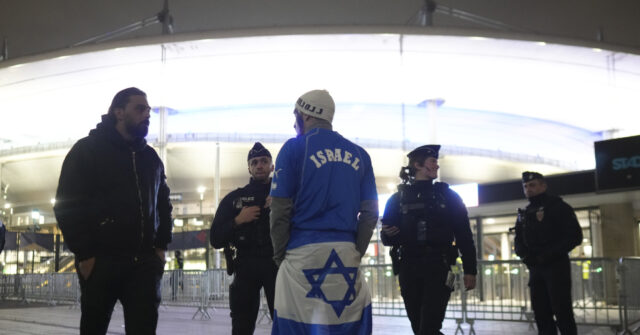In recent events surrounding a high-profile football match between France and Israel, tensions erupted following a week of distressing incidents involving Israeli fans in Amsterdam. French authorities anticipated possible violence at the Stade de France due to a prior match where pro-Palestinian groups reportedly attacked Jewish tourists, prompting a significant police presence to ensure safety. With over 4,000 officers deployed to the match, the Israeli government advised its citizens to avoid public events in Europe, leading to a diminished turnout of Israeli supporters, many of whom were escorted by police in chartered coaches. The match concluded in a 0-0 draw but was marked by various disruptions, including booing of the Israeli national anthem and the display of Palestinian flags.
Despite the heavy security, a scuffle did occur within the stadium, though it was quickly contained without police intervention. Reports indicated that football supporters confronted a man who was attacked while on the ground. Outside the stadium, pro-Palestinian activists protested against the match, asserting that it should not have been held. Criticism targeted French President Emmanuel Macron, with leftist groups labeling his attendance as morally objectionable given the conflict involving Israeli actions in Gaza. The French government maintained its position of not succumbing to perceived threats and insisted that maintaining public order did not equate to capitulating to mob demands, with Interior Minister Bruno Retailleau emphasizing a commitment to not yield to hate.
The presence of anti-Israel protests and protests against the match reflects the growing divide and animosity regarding the Israeli-Palestinian conflict that has penetrated even cultural and sporting events in Europe. The night before the match, significant unrest occurred in Paris, where thousands marched against Israel, leading to clashes with police and vandalism of businesses. This incident illustrates the degree to which the conflict has mobilized opinions and actions among various political factions within France, further complicated by demographic shifts that have changed urban landscapes across Europe.
The evolving situation for Israeli nationals attending events in Europe indicates increasing challenges amid rising tensions. Many cities now regard football matches involving Israeli teams as high-risk, driven by perceptions of potential unrest. A striking example is Belgium, where no city was willing to host an Israeli football match due to concerns related to public safety and the ongoing Israel-Hamas conflict. Belgian authorities voiced worries about the risks of riots and unrest that could stem from such games, ultimately indicating a distinct unwillingness to expose citizens to potential danger.
Legislative and societal attitudes toward Israeli athletes have been affected by changing demographics and rising anti-Israel sentiment within some European nations. The reluctance of cities in Belgium to host matches further highlights how a perception of radicalization has taken hold alongside an increasing wariness of external perceptions and civil order. The decision to halt the games underscores a broader trend in Europe where local populations, influenced by mass migration and social movements, are exhibiting increased sensitivity to events perceived as contentious.
These events collectively demonstrate the intricate relationship between sports, politics, and public sentiment in Europe today. As the environment surrounding sporting events becomes more charged with political undertones, the experience of Israeli athletes and fans reflects a tense landscape that could shape future international matches and public gatherings. The hesitance of local authorities to facilitate sporting events involving Israel may lead to a growing alienation of Israeli athletes in European sports arenas, creating further divisions in an already complex geopolitical landscape.

